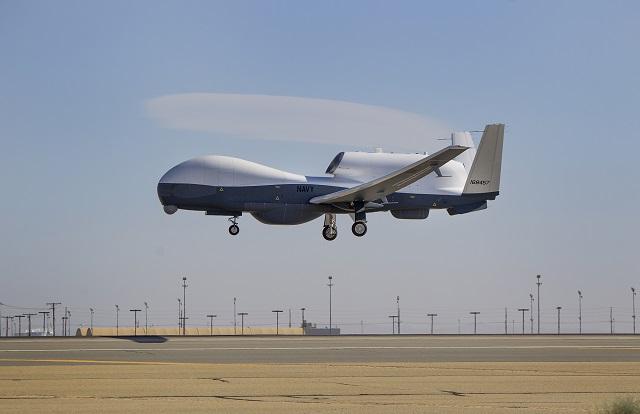Triton to herald sea-change in RAAF surveillance
Posted By Matt Rainbow on January 27, 2017 @ 14:30

The arrival in November of the first of Australia’s new P-8A Poseidon Maritime Patrol Aircraft is a reminder that the days of the RAAF’s AP-3C Orions are numbered. For three decades the Orions of 10 and 11 Squadrons performed roles, including anti-surface and anti-submarine warfare, search and rescue and overland intelligence, surveillance and reconnaissance (ISR).
The Poseidon can fly faster and stay on station longer than the Orion, can be refuelled in-flight and its radar, Electro Optic and Electronic Support Measure systems are a generation ahead of the latest AP-3C upgrades. The RAAF intends to have its 15 Poseidons in service by the late 2020s, on the same missions as the Orion.
But Australia will soon be acquiring a very different aircraft which is much less of a like-for-like replacement. The MQ-4C Triton, to be in service by 2019, will also be filled with sensors, but without a single crew member on-board. The remotely piloted aircraft (RPA) will conduct maritime surveillance for the RAAF alongside the Poseidon.
The RAAF operates Israeli Herons in Afghanistan but the Triton is a strategic-level asset which will likely be tasked at the highest levels of Defence. The RAAF plans to buy only seven for $2–3 billion. To operate the Triton effectively, the ADF will need to deal with several issues.
A benefit of RPAs is that the crew remains safely on the ground, sometimes thousands of kilometres away. American RPAs operating in the Middle East and South West Asia have been piloted from control centres near Las Vegas. It’s now possible for Full Motion Video from an RPA over Yemen to be viewed by analysts in Qatar, Germany, Langley, or anywhere in the world. But that ‘reach back’ also contains risks.
In the late 1960s, US President Lyndon B. Johnson personally chose targets for American bombers. With today’s RPAs, Johnson could have watched live video footage from North Vietnam, chosen what to destroy and then watched that happen in real time. The ‘reach back’ Triton will give Australia’s senior political and defence leaders brings the risk that, even after the Triton crew has been given its mission orders, there’s the possibility of ‘real time’ interference while the mission is underway. That’s heightened by the Triton’s almost certain involvement in the politically-sensitive border security role. While this ‘reach back’ will also exist with the Poseidon, there will rarely be a decision-maker standing directly behind the aircraft’s crew telling them what to look at or what not to look at.
While the Triton won’t carry weapons, it will be fitted with a surveillance radar, an EO/IR sensor and an ESM suite. The US Navy is planning to use the Triton in the airborne signals intelligence mission [1]. Triton patrols lasting upwards of 24 hours mean those sensors will collect a great deal of data, which will need to be transmitted and analysed both in-flight (to determine what’s going on around the aircraft and whether something needs to be reacted to) and stored for post-mission analysis, such as pattern of life studies. The analysis will require many trained personnel across Defence and other government agencies which will use the information. As a former USAF Deputy Chief of Staff for ISR stated [2], ‘We are going to find ourselves in the not too distant future swimming in sensors and drowning in data.’ American experience [3] with the Global Hawk RPA (upon which the Triton is based) found that of the 300 personnel required to maintain a constant RPA combat air patrol, only 13% were actually flying the aircraft. Those needed to exploit the collected information amounted to 34% of the total personnel.
Finally, there will likely be political limits to where Triton can be used. While the ADF will have undoubtedly learned lessons from operations in Afghanistan, there are considerable differences between a largely permissive environment where the RPA’s presence is allowed by the host government, and a strategic platform operating over and adjacent to countries which may not want it there.
Not having aircrew means RPAs can be operated in areas too dangerous to have an aircraft with a crew, who if caught would almost certainly not be accorded the protections of the Geneva Conventions. US overflights have been dubbed ‘spy flights’ and Triton operations will almost certainly be given the same nickname, not just by the Australian media, but by countries near where they are operating. A Triton looking for boats of asylum seekers in the Timor Sea may not be viewed favourably by Jakarta.
Orion crews over the South China Sea, have routinely received radio challenges from the Chinese military [4] and they’ve been able to respond that they’re exercising their internationally guaranteed freedom of navigation rights to avoid any escalation. The Triton, with no crew on-board, would likely have more difficulty making that claim. It’s just not the same when the person on the radio is thousands of kilometres away. Indeed an adversary could likely have fewer qualms about destroying an RPA than its manned equivalent.
The Triton will be an important part of the RAAF’s move to become a Fifth Generation Air Force [5]. But platforms alone won’t make that work. It’ll be how the RAAF uses its new equipment, especially together, that determines how effectively it will perform.
Article printed from The Strategist: https://aspistrategist.ru
URL to article: /triton-herald-sea-change-raaf-surveillance/
URLs in this post:
[1] signals intelligence mission: http://www.bga-aeroweb.com/Defense/RQ-4-Global-Hawk.html
[2] stated: http://www.defenseindustrydaily.com/uav-data-volume-solutions-06348/
[3] American experience: http://nation.time.com/2012/09/10/manning-unmanned-systems/
[4] radio challenges from the Chinese military: http://www.abc.net.au/news/2016-02-03/raaf-patrol-flights-facing-more-regular-resistance-from-chinese/7138100
[5] Fifth Generation Air Force: http://www.airforce.gov.au/docs/Plan-Jericho-Booklet.pdf
Click here to print.